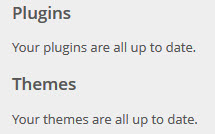 It’s a phrase that’s all too common in open source software development, “iterate quickly, release often“. The idea that any time a bug is fixed or an improvement is made that those fixes should be pushed out immediately to the end-user. The process is wonderful for companies operating under the Software As A Service umbrella but not so much for WordPress plugin developers. Coen Jacobs, a core developer for WooCommerce shared his thoughts on the matter in a recent blog post.
It’s a phrase that’s all too common in open source software development, “iterate quickly, release often“. The idea that any time a bug is fixed or an improvement is made that those fixes should be pushed out immediately to the end-user. The process is wonderful for companies operating under the Software As A Service umbrella but not so much for WordPress plugin developers. Coen Jacobs, a core developer for WooCommerce shared his thoughts on the matter in a recent blog post.
Coen explains that WordPress is now a large CMS and it’s time for plugin developers to help out by creating a sensible release strategy.
It’s the responsibility of the plugin developers to make sure their releases are as stable as they can be. There is no difference there between a plugin that adds social sharing buttons, or a full featured eCommerce plugin.
WordPress is no longer a small CMS, it’s being used in large, professional websites. Plugin developers have a great share in the success of the CMS in general. It’s now time to take it to the next level and make sure that we release updates responsibly and with our end users in mind.
It’s an annoying process to update a plugin three times a week. I’m all for developers taking a more sensible approach to how they release updates. Security fixes should always be released as soon as possible. However, if it’s just a minor fix such as a typo within the plugin’s readme file, there is no need to burden users with an update message.
I don’t entirely agree with this. There is a balance needed.
Just because you have fixed a bug does not mean you should push out an update.
Just because you have fixed a bug within a day of a previous release also does NOT mean you should NOT push out an update.
It really depends on the kind of bug that been fixed or the improvement that has been made. If it’s a crucial fix, please, please, please push it immediately. If user’s are annoyed by too many updates, let them be. It’s better to make crucial fixes asap than to try to not avoid users by pushing too many updates.